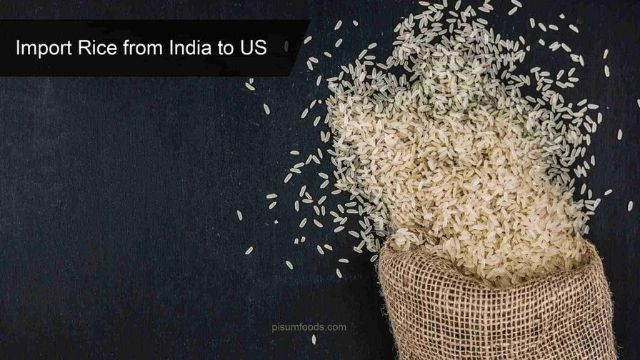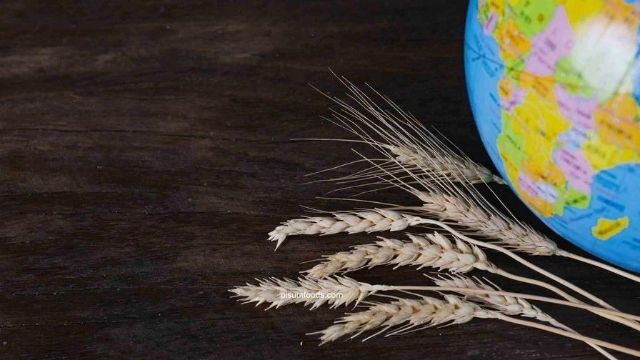 Translate
Translate Translate
TranslateRice is used in several cuisines across the world. The United States imports a large quantity of Rice from India each year. Importing rice from India includes documentation and paperwork, permissions and several other steps. While exporting rice from India to the United States, one must adhere to the rules from the Food and Drug Administration (FDA), the U.S. Department of Agriculture (USDA), and Customs and Border Protection (CBP). Indian rice imports to the US can be carried out but all the rules and regulations have to be strictly followed.

If you can import rice from India to the USA depends on the purpose for which you are importing Rice, for personal purposes or for commercial purposes. Import rice from India for personal or non-commercial purposes is prohibited. The import of rice for personal purposes is prohibited because the rice is at risk of carrying insects or pests. Customs and Border Patrol recommend against bringing rice into the States, especially if it is in a loose packaging such as burlap. The import of rice from India is prohibited for non-commercial purposes. Import for commercial purposes is allowed from Indian if the importer has abided by all the federal rules and regulations. You can only import rice into the United States from India if you are a commercial dealer whose shipment has been properly inspected and declared free of the Khapra beetle.
Importing rice from India requires you to adhere to the rules of three main bodies, the USDA, the FDA and the CBP. Import of Rice from India requires the approval of the following bodies:
The U.S. Department of Agriculture also known as USDA protects the health of the country’s agricultural and natural resources.
The U.S. Food and Drug Administration or FDA operates under the Department of Health and Human Services. The FDA regulates a broad list of products to ensure public health.
The Customs and Border Protection is the largest agency of the United States Department of Homeland Security. The CBP has oversight over the border and is responsible for overseeing international trade, collecting import duties, and other duties.
The Food and Drug Administration has several requirements for importing rice from India. All commercial imports of food products need prior notice with the FDA. In addition to the usual CBP entry documents, after arrival at the port of entry, Customs and Border Protection ask for proof or prior notice to release the food shipments at the border. The Food and Drug Administration does not approve individual shipments. The products either need to have FDA sanction or the facilities that handle the products have to be registered with the FDA.

There are several processes, details, exceptions, intricacies and import rules to follow in the importing of food into the United States. The Customs and Border Patrol, therefore, recommends using a licensed customs broker to help you with the process. However, if you are confident about the process and the information you have you can do it yourself too. Customs brokers are well experienced in the field and know the rules and regulations of importing products inside out. They will know the exact documents you need for your shipment to be imported successfully into the States. Licensed Customs Brokers also calculate customs bond amounts and such other things.
You should contact the port of entry from where you wish to ship in advance so that you know all the requirements and information. You can also consult a CBP import specialist at the port of entry. The specialist will tell you the requirements based on the type of food product, country of origin, and such other restrictions. The CBP entry forms need to be filed within 15 days since the shipment has arrived. After 15 days, they will be sent to a warehouse and storage fees could be charged.
The Animal and Plant Health Inspection Service regulates the import of rice and rice products into the United States. This is primarily because these items carry diseases such as downy, mildew, leaf smut, blight, glume blotch so on and so forth. Therefore the rice importers should have a permit. The permit can be obtained by an application process online or in the print form. The application should be made at least 30 days before the shipment is set to arrive. It can sometimes take longer for the permit to go through. The permit remains valid until the listed expiration date. Reapplying for a permit isn’t necessary every time you have a shipment. United States residents with street addresses in the country can only receive a permit.
Single Entry Bond
A single entry bond allows a one-time shipment into the United States. This is the perfect customs bond for you if you don’t have recurring business in the United States.
Continuous Bond
A continuous bond is valid over the course of a year. It is then automatically renewed unless cancelled by the importer or the CBP. If you are continuously importing goods throughout the year, a continuous bond is the best option.
There are several documents required for importing rice by the US Government. Here is a list of the documents:
The following import documents should be obtained so that the shipment can cross the border without any hassle:
A commercial invoice is a list of the products in the shipment, their value, quantity, and details about the manufacturer and importer.
A packing list makes the customs process easier by mentioning the contents, dimensions and weight of each container.
A Bill of lading is a receipt of the contract between the carrier and shipper. It contains information about the shipper, the carrier, the contents of the shipment, the point of origin, the destination and so on.
The Certificate of origin verifies that your shipment is from India.

India is the world’s leading exporter of rice. According to the USDA, the country exports around 12.5 million metric tons of rice each year. Thailand is the second biggest exporter of rice and exports about 10 million metric tonnes. Even though there are many rice import countries from India, the US imports more rice from Thailand. This is primarily because the US largely imports jasmine rice, which is grown in Thailand.
India almost dominates the world rice trade. The country exports over $7 billion worth of rice and the worldwide total are about $20 billion. India is therefore known to be a reliable and robust source of rice import. China has been the biggest importer of rice since 2013. At first, China used to only import basmati rice from India, but now it has permitted imports of non-basmati rice as well. Here are the countries which largely import rice from India:
Iran imports the highest quantity of rice from India according to the 2019 statistics. Iran imports 0.7 million tonnes of rice worth US$1.3 billion from India.
Saudi Arabia also imports a huge quantity of rice from India. The rice import of Saudi Arabia from India is worth about US$1.1 billion.
China is also a major importer of rice from India. China imports rice worth about $515,000.
The US imports large quantities of rice from India every year. The US imports rice worth around $243 million from India.
It is highly recommended to enlist a licensed customs broker while exporting rice from India into the United States. Importing food into the United States is a complicated process. Every food product and country has to follow a set of rules and regulations for importing goods into the States. A customs broker is recommended as he has expertise in the field and the process can be completed without any hassle or confusion. An experienced and reliable customs broker will help you right from documentation and paperwork, deciding the best shipping options and so on. You will, therefore, have no reason to worry about the shipment once you approach a customs broker.